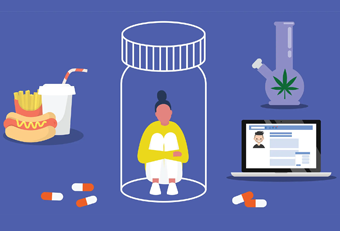
Addiction is a chronic and progressive disease that is characterized by compulsive drug seeking and use, despite the harmful consequences. It is a complex disorder that affects the brain, body, and behavior. Addiction can take many forms, including alcohol, tobacco, drugs, gambling, sex, and even food. Addiction is a serious problem that affects millions of people worldwide, and it can lead to a wide range of negative consequences, including health problems, financial difficulties, and strained relationships.
Addiction can be caused by a variety of factors, including genetics, environment, and personal experience. People with a family history of addiction are more likely to develop an addiction themselves. Additionally, people who experience trauma, stress, or mental health problems are also more susceptible to addiction. Environmental factors such as peer pressure and easy access to drugs or alcohol can also contribute to addiction.
The brain plays a significant role in addiction. When a person consumes a substance or engages in a behavior that activates the brain's reward system, it releases dopamine, a neurotransmitter that produces feelings of pleasure and happiness. Over time, the brain becomes desensitized to dopamine, and the person needs more of the substance or behavior to achieve the same level of pleasure. This is known as tolerance, and it can lead to dependence and addiction.
Addiction can be difficult to overcome, but it is possible with the right treatment and support. The first step in overcoming addiction is acknowledging that there is a problem. Many people with addiction deny or minimize the problem, but it is important to be honest with oneself about the extent of the problem. Once a person acknowledges the problem, they can seek treatment.
There are many different types of addiction treatment, and the right approach depends on the individual's needs and preferences. Some people may benefit from inpatient treatment, where they receive around-the-clock care and support. Others may prefer outpatient treatment, where they can receive treatment while continuing to live at home. Treatment may include therapy, medication, or a combination of both.
Therapy is an essential component of addiction treatment. It can help a person understand the underlying causes of their addiction and develop the skills and strategies to manage triggers and cravings. There are many different types of therapy, including cognitive-behavioral therapy (CBT), which helps people change negative thought patterns and behaviors, and motivational interviewing, which helps people build motivation and confidence in their ability to change.
Medication can also be a useful tool in addiction treatment. Some medications can help manage withdrawal symptoms and reduce cravings, making it easier for a person to stay sober. Medications may also be used to treat underlying mental health problems that contribute to addiction, such as depression or anxiety.
Support is crucial in addiction recovery. It can come from family, friends, support groups, or a sponsor. Support can provide a sense of accountability, motivation, and encouragement, and it can help a person stay committed to their recovery.
Addiction is a challenging disease, but it is possible to overcome with the right treatment and support. If you or someone you know is struggling with addiction, it is important to seek help. Addiction is not a sign of weakness or moral failing; it is a medical condition that requires treatment. With the right support, it is possible to recover and lead a fulfilling life free from addiction.


Get Free Appointment
We are more than happy to give advice on which counselling is most suitable for your needs, depending on your problems. Why not ask us to view your problems and discuss for solution.
